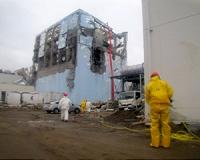 |
Tokyo (AFP) April 7, 2011 Japan said Thursday it is considering expanding the area covered by a compulsory evacuation order, with no immediate end in sight to the world's worst nuclear accident since Chernobyl. As emergency workers began pumping nitrogen into the quake-damaged Fukushima Daiichi plant to prevent further explosions, the government said it was seeking advice from experts on whether more areas should be evacuated. Residents within a 20-kilometre (12-mile) radius of the nuclear power plant have already been ordered to leave, while those living up to 10 kms beyond that have only been told to stay indoors. Evacuation orders are currently issued when residents are at risk of receiving radiation of at least 50 millisieverts, but the government said that arrangement assumed only brief exposure. "The standard does not take into account the effects of accumulative exposure," Chief Cabinet Secretary Yukio Edano said. "We are discussing what standards to use for accumulative radiation." Edano said a procedure to inject nitrogen gas, designed to reduce the risk of a hydrogen explosion, was "proceeding smoothly." In the days after the March 11 earthquake and tsunami crippled the plant, large explosions resulted from hydrogen accumulation near the reactors, damaging the outer buildings housing them. Radiation from the plant has leaked into the sea and air, contaminating vegetables and raising fears over marine life in a country where the national diet depends heavily on seafood.
earlier related report More than 130 elementary schools and kindergartens in Gyeonggi province surrounding the capital Seoul cancelled or cut classes after rain began falling on orders from the provincial education office. An office spokesman called it part of "preemptive measures for the safety of students". The office had told schools Wednesday to cancel or shorten classes due to "growing anxiety among students and parents over conflicting claims on the safety of radiation exposure". Schools in remote areas, where students have a long walk to class, were particularly encouraged to cancel activities. At schools which stayed open, teachers were advised to suspend outdoor activities. Complaints from parents mounted on the website of Seoul city's education office, which refused to cancel classes and called for a calm response to the fears. "Please order class cancellation. I'm worried to death about my kid and can't sleep," said one posting. Education authorities in North Chungcheong province south of Gyeonggi postponed football, baseball and other sporting events. Concern grew in the nation closest to Japan after the weather agency said Monday that radioactive material from the crippled Fukushima nuclear plant may be carried to the peninsula by southeasterly winds. The amount of radioactive material contained in the rainfall is too tiny to pose any health threat, the prime minister's office said Thursday, calling for education offices to refrain from "making parents nervous".
Share This Article With Planet Earth
Related Links Space Technology News - Applications and Research
 Radioactive water leak into sea stops at Fukushima: Jiji
Radioactive water leak into sea stops at Fukushima: JijiTokyo (AFP) Apr 06, 2011 Radioactive water stopped leaking into the Pacific Ocean from Japan's crippled Fukushima nuclear plant Wednesday, Jiji Press reported, citing the operator Tokyo Electric Power Co. (TEPCO). TEPCO had on Tuesday injected sodium silicate, a chemical agent known as "water glass", to solidify soil near a cracked pit, from where large volumes of highly radioactive water had been seeping through an ... read more |
|
| The content herein, unless otherwise known to be public domain, are Copyright 1995-2010 - SpaceDaily. AFP and UPI Wire Stories are copyright Agence France-Presse and United Press International. ESA Portal Reports are copyright European Space Agency. All NASA sourced material is public domain. Additional copyrights may apply in whole or part to other bona fide parties. Advertising does not imply endorsement,agreement or approval of any opinions, statements or information provided by SpaceDaily on any Web page published or hosted by SpaceDaily. Privacy Statement |